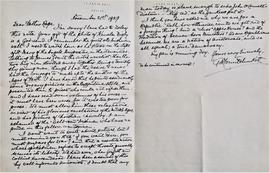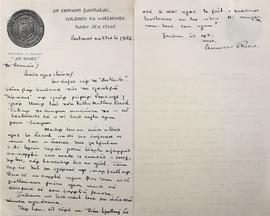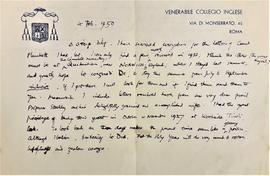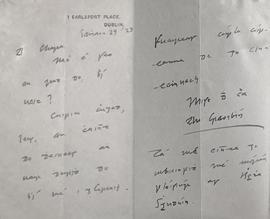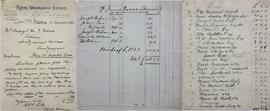Letters from George Noble Plunkett
- IE CA CP/3/2/2/9
- File
- 1928-1951
Part of Irish Capuchin Archives
Letters from George Noble Plunkett (1851-1948), 40 Elgin Road, Dublin, to Fr. Henry Rope. The letters include references to Plunkett’s desire to establish an ‘Academy of Christian Art’ in Dublin, Catholic literature, Father Rope’s visits to the Plunkett residence, and to contemporary political matters and public affairs in both Britain and Ireland. A recurring theme in the correspondence is Plunkett’s continuing republican opposition to the post-Treaty settlement in Ireland. An extract from a letter
written on 21 November 1929 reads:
‘I don’t want to write about politics, but I remind you that “if you want peace, you must prepare for war”; and, that a resolute nation, whose spokesmen refuse to accept threats, generally secures its liberty. We had won, when [Arthur] Griffith and [Michael] Collins surrendered: I have been assured of this by well informed unionists. I doubt that any man today is slave enough to echo John O’Connell’s dictum. “Nuff ced”, as the Yankees put it.
I think you asked me why we are for a Republic. Well, how otherwise could we get rid of a foreign King? And a “class” Upper House”? And the tradition of Heaven-born Ministers? We are republicans because we are a nation of aristocrats, and so all equal; a true democracy.
My pen is running dry.
Yours very sincerely,
G.N. Count Plunkett
To be continued in our next’.
The file also includes some letters from George Noble Plunkett’s wife (Josephine Plunkett née Cranny), and daughter Mary Plunkett. The letter from Mary Plunkett refers to the death of Count Plunkett. It reads ‘The poor old man was in bed for more than three years. We expected that he would go very quickly. Instead of that he was dying for twelve days. The poor old body was worn out, but that strong valiant spirit held on. He suffered a lot, so much that we prayed that God would take him. The end was very quiet’. (5 May 1948). A letter to Fr. Senan Moynihan from Fr. Henry Rope in this file refers to his donation of Plunkett's correspondence ‘for your Archives, which may also one day be of historical interest’. He also notes that he has given some of his correspondence with Count Plunkett to Saint Isidore’s College in Rome. (20 Dec. 1951)

